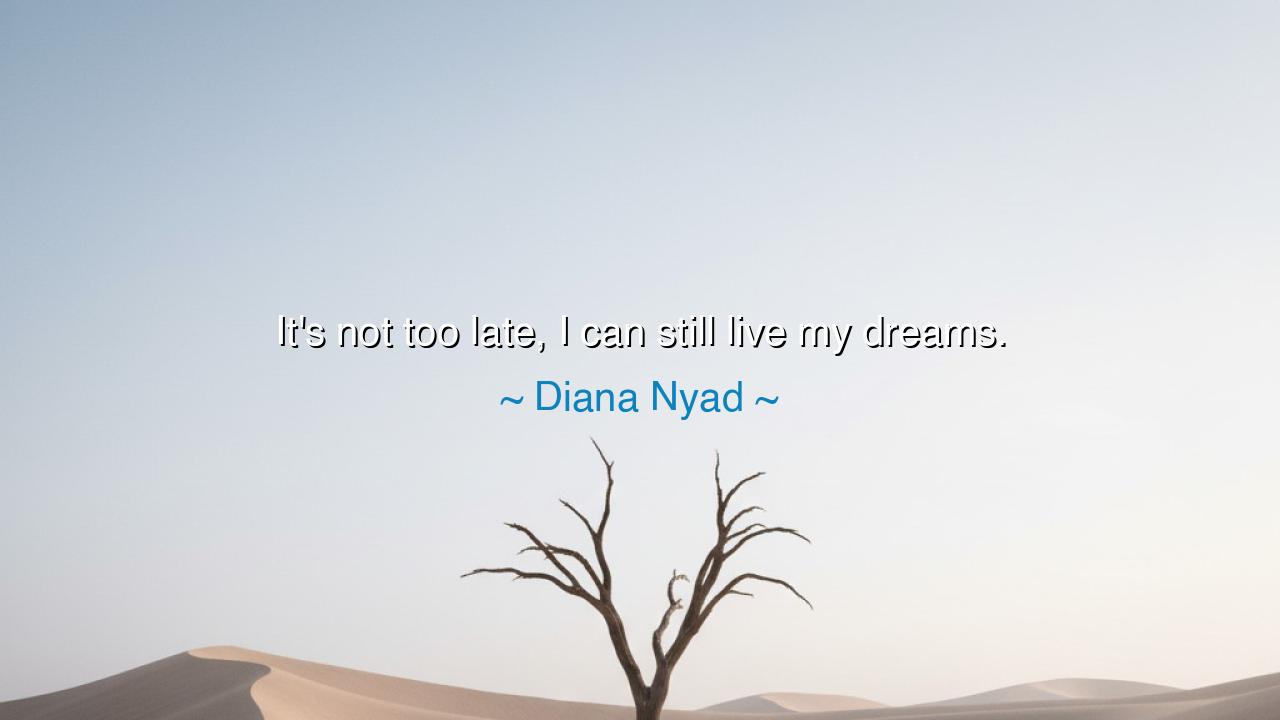
It's not too late, I can still live my dreams.






The words of Diana Nyad, “It’s not too late, I can still live my dreams,” resound like the cry of a soul unbroken by time. They are not the words of naïve optimism, but of a spirit that has wrestled with the years, faced defeat, and yet refuses to surrender the sacred fire of purpose. In this declaration, Nyad gives voice to an ancient truth—that dreams do not age, that the passage of years may weather the body, but cannot conquer the will that burns within. To speak these words is to defy despair itself; it is to stand against the slow erosion of hope and to proclaim that life, so long as breath remains, is still a field of possibility.
To understand the weight of this statement, we must recall the life of the woman who spoke it. Diana Nyad, a long-distance swimmer of extraordinary endurance, first attempted to cross the treacherous waters between Cuba and Florida in her twenties. The journey spanned over a hundred miles, a feat nearly beyond human strength—filled with currents, storms, and the lurking danger of jellyfish and sharks. She failed, again and again. For decades, the dream lay dormant, drowned beneath the tides of time. Yet, when she reached the age of sixty-four—an age when most have turned from ambition toward reflection—she whispered these words to herself: “It’s not too late, I can still live my dreams.” And she returned to the sea.
In 2013, after thirty-five years of longing and defeat, Diana Nyad became the first person ever to swim from Cuba to Florida without the protection of a shark cage. Her body trembled, her skin burned, her mind wandered between life and oblivion—but her spirit remained steadfast. When she emerged on the shores of Key West, her message to the world was clear: “Never, ever give up.” Her quote stands as both the seed and the flower of that truth. It is not too late—not for the aged, not for the weary, not for those who have failed a thousand times—for as long as life endures, the dream remains possible.
The ancients would have recognized in Nyad’s words the essence of heroic endurance. The Greeks called it thymos—the fiery courage of the heart that drives a person to struggle against fate itself. For them, to give up one’s dream was not only a personal failure but a betrayal of one’s divine spark. Consider the story of Odysseus, who wandered for twenty years in search of home. Time aged him, the gods tested him, the sea conspired against him—but he never ceased his journey. His body grew frail, but his spirit remained indomitable. So too with Nyad: her ocean was her Odyssey, her dream the distant Ithaca of her soul.
There is also wisdom here for all who stand at the edge of resignation. For in every life comes a moment when we believe it is too late—that our youth is gone, that our strength has waned, that our chance has passed. Yet Nyad’s words cut through that illusion. They remind us that the boundaries we perceive are not of nature, but of fear. The dream is not measured by the years that have passed, but by the heart that still beats within us. The artist can still paint, the student can still learn, the broken can still heal, the seeker can still find meaning. So long as you live, there remains a path to your horizon.
Her quote also carries a quiet defiance against the modern worship of speed and success. In a world that celebrates those who achieve early, Nyad honors those who persevere late. She teaches that life is not a race, but a pilgrimage—a long journey where patience and endurance often matter more than youth and talent. The path of fulfillment is rarely straight; it winds, falters, and begins anew. And every beginning, no matter how delayed, carries its own kind of glory.
From this we may draw a lesson for all who listen: it is never too late to begin again. Whatever dream you have buried beneath fear or failure, dig it up. Examine it. Feed it with belief. Perhaps your body is slower, your life more complex—but your heart still knows the rhythm of courage. Begin small if you must, but begin. If you are an artist, return to your canvas. If you are a student, open the book again. If you are a dreamer, dream once more. The spirit of perseverance does not age; it only deepens.
And let the final truth be this: life’s greatest tragedy is not in failing to reach the dream, but in ceasing to chase it. Diana Nyad’s words remind us that hope is not the privilege of the young, but the power of the living. So long as your lungs draw breath and your heart yet beats, whisper these words to yourself: “It’s not too late, I can still live my dreams.” For the one who believes this has already begun the journey, and in that belief lies the victory that transcends all time.






AAdministratorAdministrator
Welcome, honored guests. Please leave a comment, we will respond soon